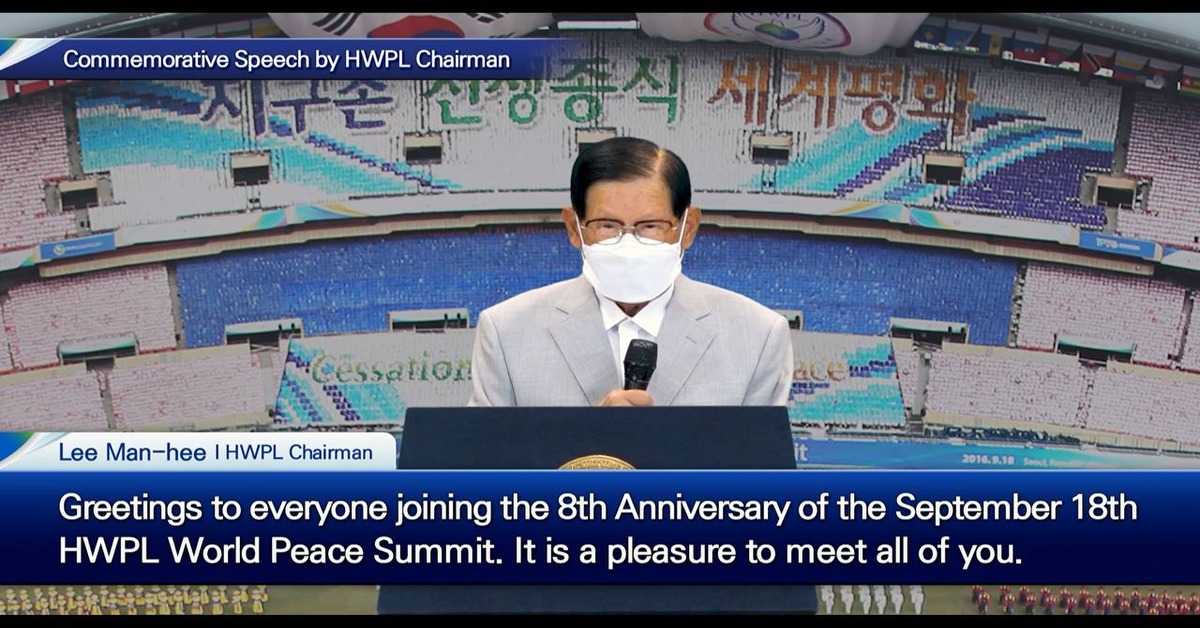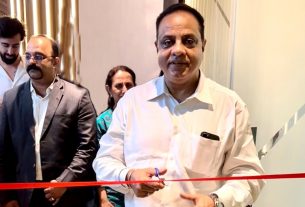On September 18th, the 8th Anniversary of the September 18th HWPL World Peace Summit was held online with the theme of ‘Peace as an Institution: A Foundation for Sustainable Development’. This event held across the world in 146 countries (including Maldives, Bangladesh, India and Pakistan), with 5,000 participants aired online to reaffirm the importance of the sustainable development guaranteed by institutionalizing peace while the global community has yet to overcome the COVID-19 pandemic and faces another threats caused by the Russian-Ukraine conflict.
Since September 18th in 2014 when the peace summit was held for the first time, Heavenly Culture, World Peace, Restoration of Light (HWPL), an international peace NGO under the UN ECOSOC, has called for solidarity for peacebuilding at the global level through collective actions with various actors including heads of state, ministers, law makers, religious leaders, educators, youth and women leaders, and reporters. This annual summit shares peace activities and achievements in cooperation with governments and civil society around the world every year.
Regarding the cause of peacebuilding at the global level, Chairman Man Hee Lee of HWPL said, “The global village has suffered from the unexpected COVID-19 that has hit every country. People are not alone in the midst of difficulties. We live in the same global village, and we are neighbors and families. Each one of us is the one who are obliged to make our world a better place to live. And shouldn’t we pass on our good world to our descendants?”
H.E. Marinus Bee, the chairperson of the National Assembly of Suriname, expressed his willingness to establish peace at the legislative level by saying, “The role of parliaments in building peace and preventing conflict is crucial.” He added, “In collaboration with HWPL the National Assembly would like to establish a framework of cooperation in achieving cessation of war and spread a culture of peace through activities to raise awareness of peace and encourage policies and programs regarding peace education.”
Octavia Alfred, Octavia Alfred, Minister for Education, Human Resource Planning, Vocational Training and Nation Excellence of Dominica, said that HWPL’s peace education was introduced to the national school curriculum in Dominica as it was “integrated into Social Studies, and also as a stand-alone.” For the reason to develop the educational source into the civics curriculum in the country, she said that the HWPL peace curriculum is helpful “in addressing the challenges of … not just students, but even what they take home to their friends and their parents, and also out teachers.”
In celebration of this ceremony, various events was held online and offline by Western Busan & Gyeongnam Branch. On September 18, the Youth Empowerment Peace Workshop (YEPW) will be held at the office of YPSA (Young Power Social In Action) in Chittagong. Through this workshop, the issues and development plans of the basic educational welfare rights of Bangladeshi youth discussed.On September 20, a “Peace-Drawing Activity” was held offline at Mukhtar School in Bactra, Afghanistan. Mursal Sattari, who is hosting the event there, is working as a peace teacher after completing the training of HWPL, and Principal Mohammad Nadir Azedpana was appointed as a goodwill ambassador for HWPL on the same day. Teacher Mursal Satari said, “We appreciate HWPL’s support for Afghanistan, and we are very happy that the entire school has become a member of HWPL through this event.” Meanwhile, in October, the “Peace-Eco Flogging Activity” will be held with the Maldives Maamendhoo School.
On the same day, journalists from the Maldives and Pakistan gather online to hold a meeting under the theme of “Peace Journalism I Want to Achieve.” It was announce the current state of the media in the two countries and share the vision of a peaceful media as a journalist.
Shan Anees, a Maldives lawyer and journalist for Rajje TV, defined peace media as “the dissemination and acquisition of important information for cooperation and coexistence between members of society and between countries.” and “Peace Journalism is a relatively less well-known term in the field of journalism, but if fact-checks are used to stabilize society, peace media will be accessible,” suggested Zahra Kazmi, a freelance Pakistani journalist.
The World Alliance of Religions’ Peace (WARP) Offices in Mumbai, Chandigarh, Delhi, and Nagpur, India, regularly compare religious texts for religious peace, including Hinduism, Zoroastrianism, Buddhism, Anglican church, Protestantism, Sikhism, and Islam. On September 25, these religious people will gather online to hold a “Reading and Awarding Poems and Letters of Peace with Hearts for Religious Peace.”
Details of the event can be viewed through the following YouTube link.
(https://youtu.be/UXlB4XzQHQ4)




